Dirt Contractors Green Bay
Find the best Dirt Contractor in Green Bay
Receive multiple Dirt Contractors quotes for your project today! Compare profiles, reviews, accreditations, portfolio, etc... and choose the best offer.
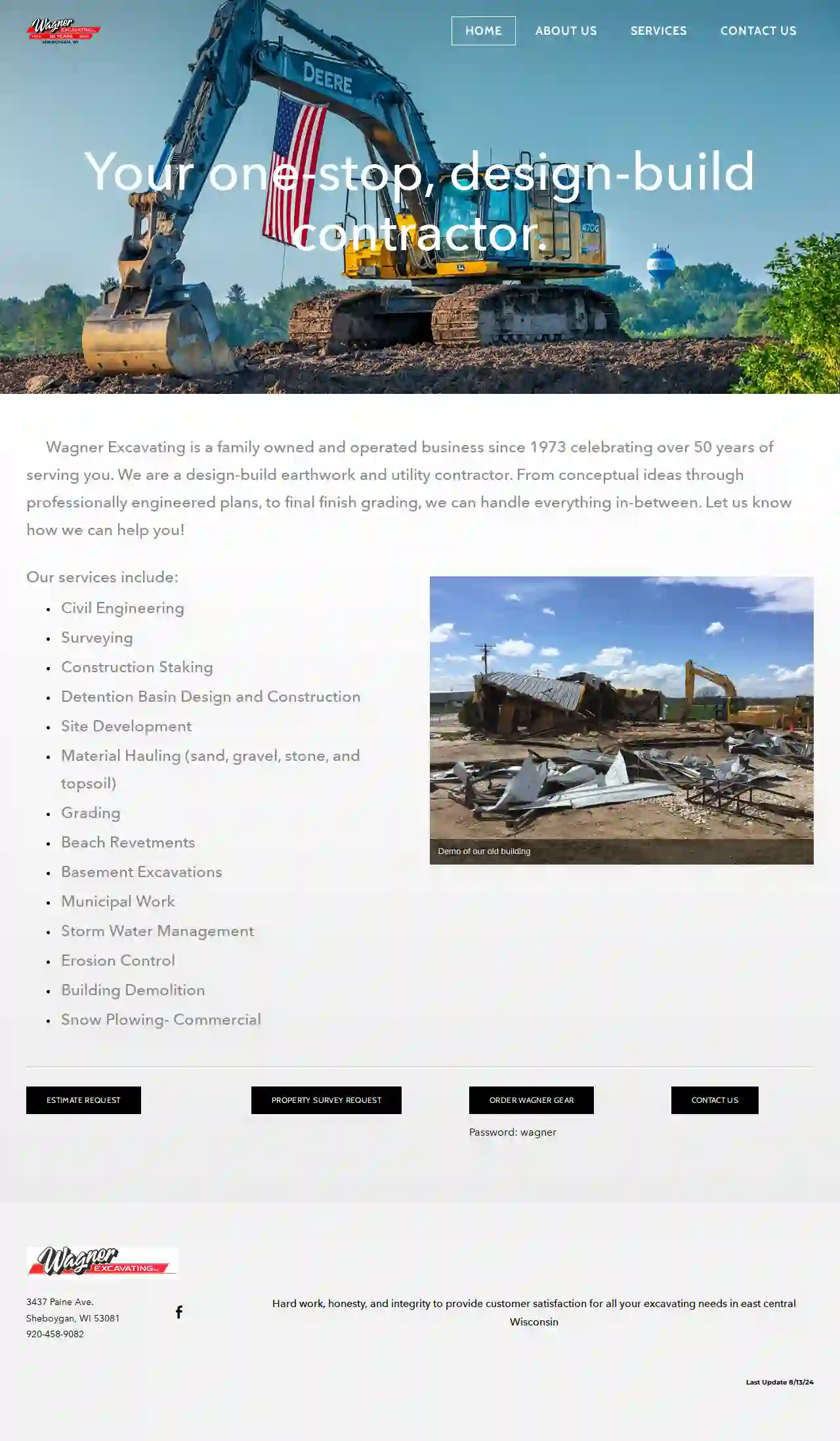
Wagner Excavating Inc
32 reviews3437 Paine Avenue, Sheboygan, 53081, USWagner Excavating: Your One-Stop Design-Build Contractor Since 1973, Wagner Excavating has been a family-owned and operated business, serving the community for over 50 years. We are a design-build earthwork and utility contractor, offering a comprehensive range of services from conceptual ideas to final finish grading. We handle everything in between, ensuring a seamless and efficient project experience. Our commitment to quality and customer satisfaction is evident in our long-standing reputation. We have earned the trust of countless clients by consistently delivering projects on time and within budget. Our team of experienced professionals is dedicated to understanding your needs and tailoring our services to provide the right solutions for your specific project. We have a rich history rooted in hard work, honesty, and integrity. Roger Wagner, the founder, started the business by plowing snow and hauling topsoil on nights and weekends. His dedication and commitment to quality quickly earned him a reputation for excellence. As the business grew, Wagner Excavating expanded its services to include commercial building projects, becoming a trusted partner for a wide range of clients. Today, Wagner Excavating continues to evolve, embracing new technologies and expanding our expertise. We are proud to offer a comprehensive suite of services, including surveying, design, permitting, site work, site utility construction, stormwater management, and trucking. Our team is equipped with the latest GPS technology and a modern fleet of equipment, ensuring efficiency and precision in every project. We are passionate about delivering exceptional results and exceeding our clients' expectations. Contact us today to discuss your project and learn how we can help you achieve your goals.
- Services
- Why Us?
- Gallery
Get Quote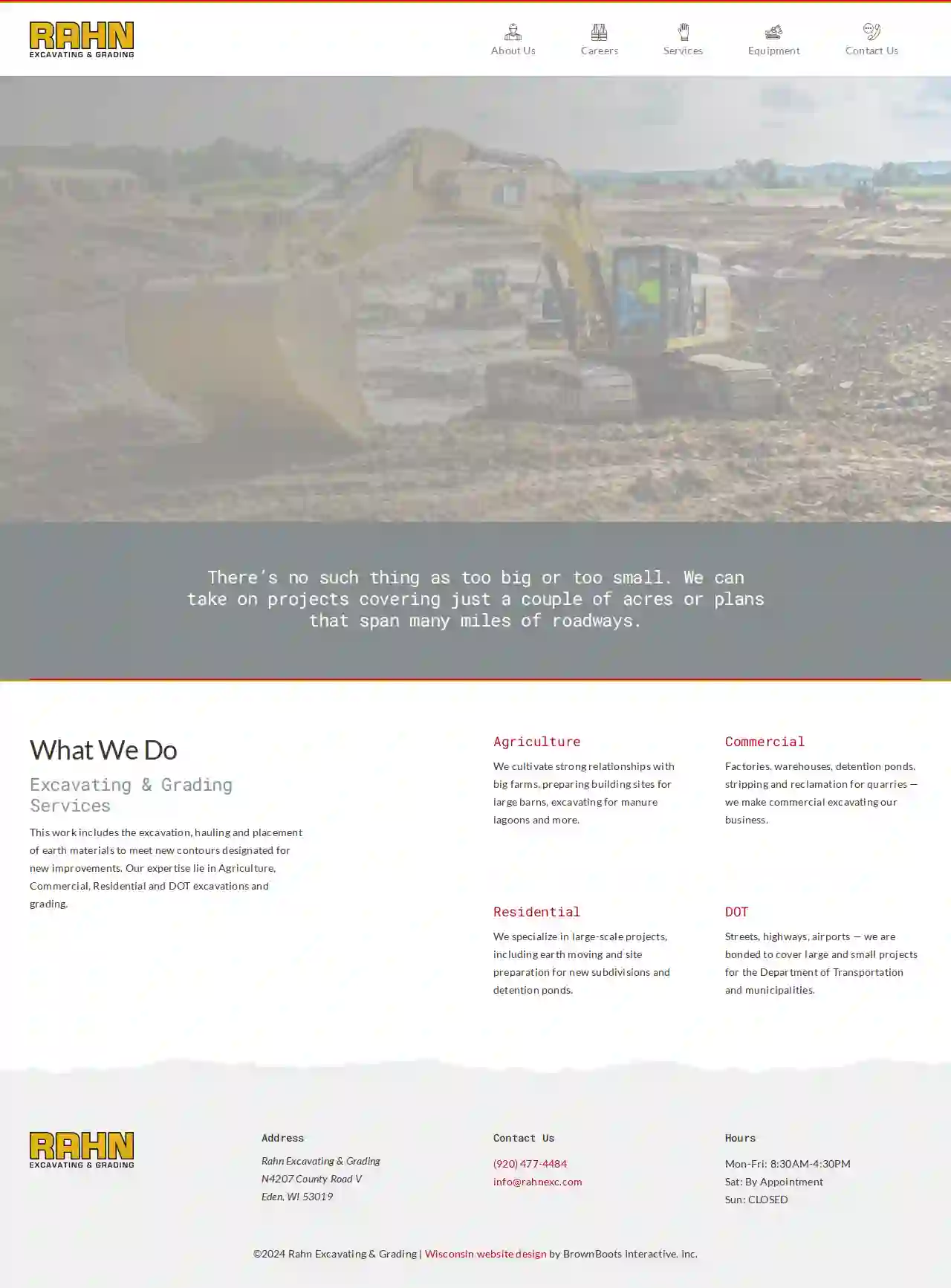
Denny Rahn Excavating
52 reviewsN4207 County Road V, Eden, 53019, USWe’re just the right size. Rahn Excavating & Grading is big enough to handle the big jobs yet small enough to provide personalized, hands-on service. History Rahn Excavating & Grading started in 1974 when Miles and Cele Rahn donated a parcel of their farmland for their son, Denny, to start his own excavating business. Miles was an active part of the company well into his 80s, and Denny remains at the helm to this day. The company began with a 977K CAT Loader, a 350 John Deer Dozer, and a 3960 International Excavator, focusing primarily on improvement projects for local farmers. Today, Rahn Excavating & Grading services a variety of industries, including commercial, municipal and residential development, leveraging state-of-the-art, GPS-controlled equipment. Despite more than four decades of experience and growth, Rahn Excavating & Grading has never lost touch with its roots. Denny’s son, Chris, serves as vice president, and the entire staff — an extended family — provides excellent, responsive service our competitors cannot match. We are small enough to be nimble but big enough to tackle large, complex projects. Why Choose Rahn Proven success in four major markets Highly competitive pricing Conscientious, ethical practices Top-of-the-line technology and equipment State certification and bonded Reputation for dependable, high-quality work Subcontractor capabilities Superb safety ratings Safety A job well done means more than just a job that’s done. Part and parcel with outstanding work is the assurance that we meet your requirements efficiently and safely. Rahn Excavating & Grading continuously trains with the Occupational Safety and Health Administration (OSHA) and the Mine Safety and Health Administration (MSHA) to ensure the safety of personnel and property on a job site. We have experienced — and sustained — some of the best MOD ratings with regard to workman’s compensation, and we pride ourselves on staying far above the industry standards in terms of safety. Key Staff Rahn Excavating & Grading was Denny’s dream from the start. With more than 45 years of experience in excavating and grading, he has built a strong company with a legacy of successful projects. Denny’s role at the company hasn’t changed much over the years. He is involved with each project from start to finish. Denny splits his time between the office and running equipment. He takes pride in the company’s fleet and is happy to have an opportunity to “move dirt” himself whene
- Services
- Why Us?
- Our Team
- Gallery
Get Quote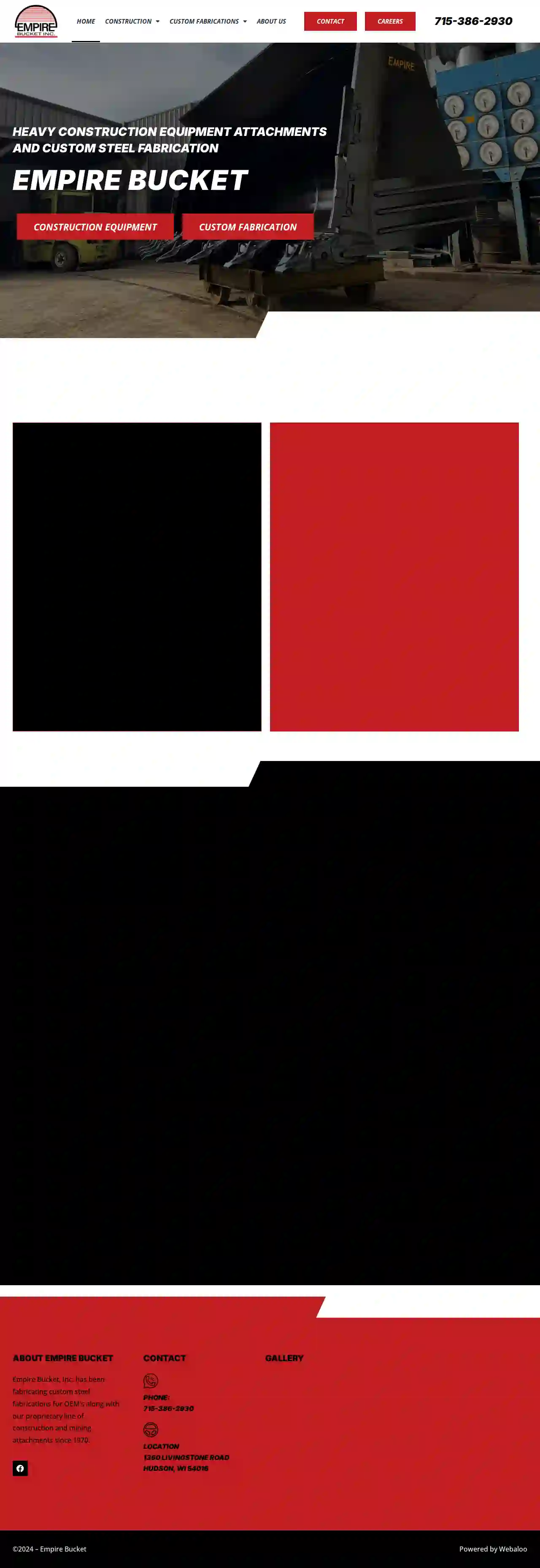
Empire Bucket Inc
4.85 reviews1360 Livingstone Road, Hudson, 54016, USHEAVY CONSTRUCTION EQUIPMENT ATTACHMENTS and custom steel fabrication You can rest assured knowing your project is in good hands at Empire. Excavators and Backhoes Visit Construction Front End Loaders Visit Construction Parts, Repairs and Services Visit Construction OEM Solutions / Project Showcase Core Competencies and Certifications Equipment and Facilities Custom / OEM Fabrications Visit Custom Fabrications Craftsmanship you can count on Empire Bucket, Inc. has specialized in construction equipment attachments and custom steel fabrication since 1970. We provide high-quality products to OEMs and end-users globally. Our custom steel fabrications are essential to machinery that manufactures, digs, moves, paves, plows, and powers projects worldwide. Our products are designed for durability and reliability. With hundreds of years of combined experience, our team offers unparalleled expertise. We employ AWS-certified welders and have certified weld inspectors to ensure top-quality fabrications. We offer customizable options to meet specific client needs. Our commitment to excellence is evident in our precision and craftsmanship. Leave us a Google review!
- Services
- Why Us?
- Gallery
Get Quote
Dykstra Brothers Excavating
4.25 reviews2741 Roberts St, Franksville, 53126, USAbout Dykstra Bros Excavating Inc. Dykstra Bros Excavating Inc. has been serving the communities of southeastern Wisconsin for over 45 years. Recognized as one of the best excavation companies in the region, Dykstra Bros Excavating, Inc. is sure to deliver high quality service and a job done right, the first time. From large scale commercial site work, excavating, grading and sewer to being a top rate demolition contractor this family-owned business can do it all. With integrity, ethics and dedication Dykstra Bros Excavating Inc. can achieve most any job that your project or operation calls for. Review our services page for the full spectrum of what Dykstra Bros Excavating Inc. can do for you! John ‘Don’ Dykstra began his business, Dykstra Excavating as excavation and grading contractors in 1951. Years later in 1976, Brothers Todd and Mike acquired the business and Dykstra Bros Excavating, Inc. was constituted. Todd’s wife, Linda began managing the office and the operations. Soon it was time for their son, Steve to learn the trade. Steve joined the company in 1992 and worked for years alongside his father and uncle gaining knowledge from their years of experience. The 70 years of experience is now carried on by Steve Dykstra, the current President of the company. He is committed to maintaining the same principles taught to him by its founding members. In fact, the name Dykstra originates from the Netherlands and refers to a group of people who dwell near an earth dike or swell which lead to its inhabitants learning how to move earth to stabilize watercourse. The high level of service offered speaks to how Dykstra Bros Excavating Inc. has built on their heritage and flourished through multiple generations, Making Dykstra Bros Excavating, Inc. the best excavation and grading contractors for your next project.
- Services
- Why Us?
- Gallery
Get Quote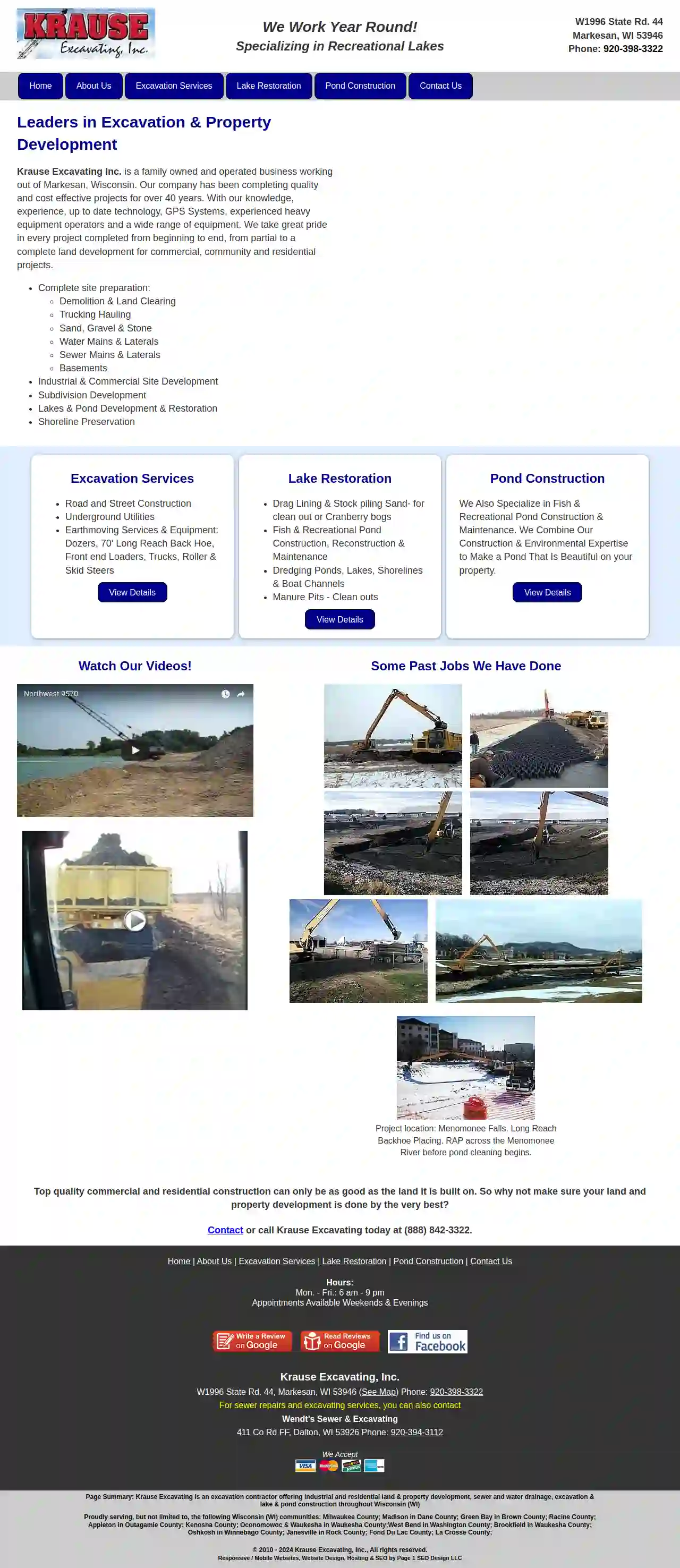
Krause Excavating Inc
52 reviewsW1996 State Rd. 44, Markesan, 53946, USKrause Excavating Inc. is a family owned and operated business working out of Markesan, Wisconsin. Our company has been completing quality and cost effective projects for over 40 years. With our knowledge, experience, up to date technology, GPS Systems, experienced heavy equipment operators and a wide range of equipment. We take great pride in every project completed from beginning to end, from partial to a complete land development for commercial, community and residential projects. Complete site preparation: Demolition & Land Clearing Trucking Hauling Sand, Gravel & Stone Water Mains & Laterals Sewer Mains & Laterals Basements Industrial & Commercial Site Development Subdivision Development Lakes & Pond Development & Restoration Shoreline Preservation Excavation Services Road and Street Construction Underground Utilities Earthmoving Services & Equipment: Dozers, 70' Long Reach Back Hoe, Front end Loaders, Trucks, Roller & Skid Steers Lake Restoration Drag Lining & Stock piling Sand- for clean out or Cranberry bogs Fish & Recreational Pond Construction, Reconstruction & Maintenance Dredging Ponds, Lakes, Shorelines & Boat Channels Manure Pits - Clean outs Pond Construction We Also Specialize in Fish & Recreational Pond Construction & Maintenance. We Combine Our Construction & Environmental Expertise to Make a Pond That Is Beautiful on your property.
- Services
- Why Us?
- Gallery
Get Quote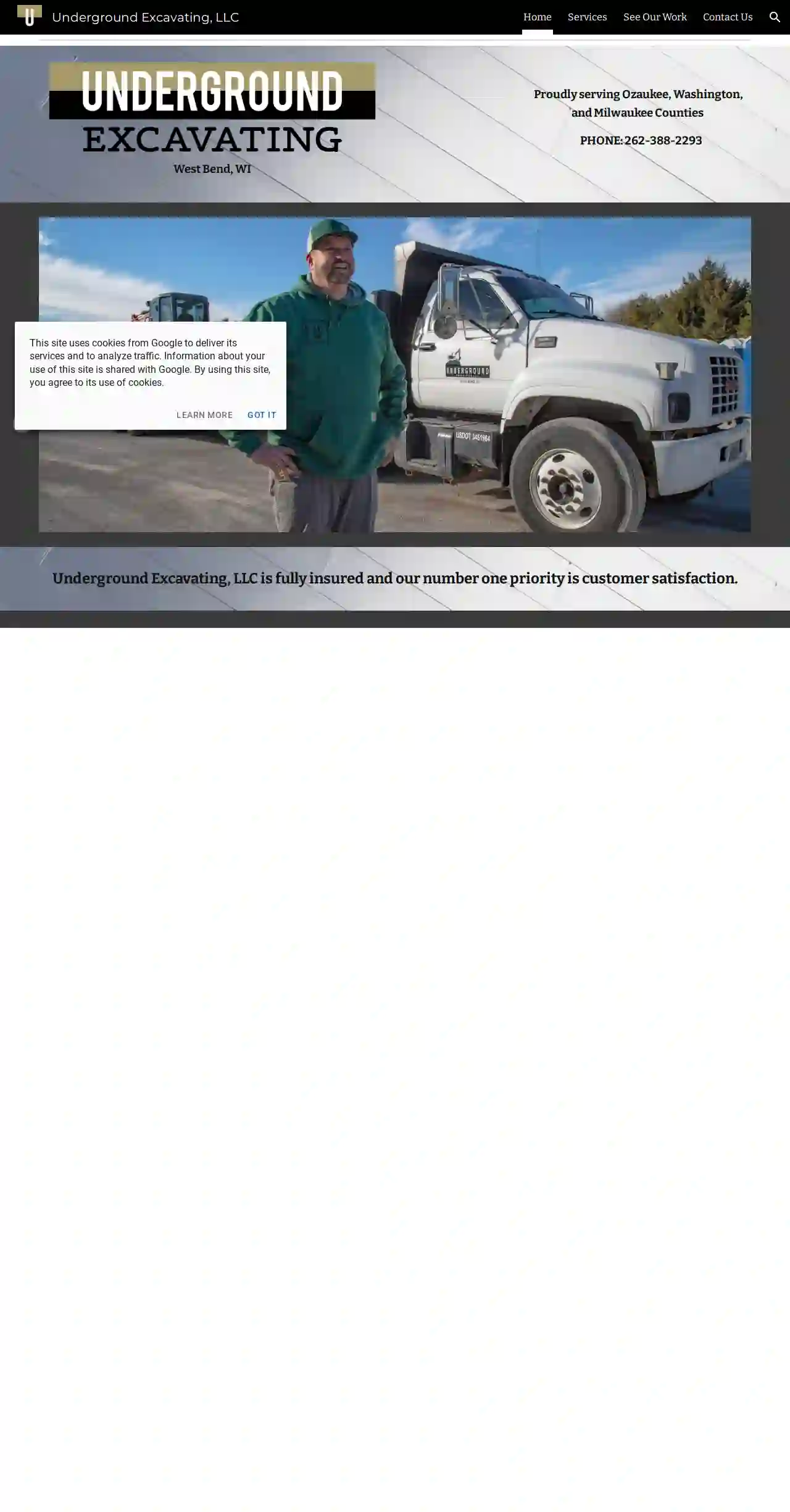
Underground Excavating, LLC.
3.45 reviewsP.O. Box 598, Kewaskum, 53040, USUnderground Excavating, LLC Underground Excavating, LLC is fully insured and our number one priority is customer satisfaction. We proudly serve Ozaukee, Washington, and Milwaukee Counties. We are committed to providing our clients with high-quality excavation and grading services at competitive prices. Our team of experienced professionals is dedicated to completing your project on time and within budget. We offer a wide range of services, including: Egress Window Installation Retaining Walls Outdoor Spaces Shoreline Stabilization Excavation & Grading Land Clearing Demolition Contact us today for a free estimate!
- Services
- Why Us?
- Gallery
Get Quote
Super Excavators, Inc.
3.910 reviewsN59 W14601 Bobolink Ave, Menomonee Falls, 53051, USDigging Deeper With Quality, Expertise & Safety Complex civil sewer and water tunneling projects demand experts with deep expertise, a focus on innovation, a foundation of cutting-edge equipment, and a culture of safety. Super Excavators draws on 70+ years of experience to deliver advanced tunneling capabilities for projects in the U.S. and Canada. We put quality people behind every project to produce results on time and on budget. One-of-a-kind and challenging tunneling projects are our specialty. Skilled project engineers drive innovation with cutting-edge tools and equipment designed to solve the toughest tunneling challenges. A Partner You Can Trust Transparent about project progress and challenges. Advanced Technologies Innovative tools & equipment for complex projects. Safety on the Job Experienced project managers for on-the-job safety. Advanced Capabilities With extensive experience in a varied array of construction methods, we minimize the need to subcontract work to other companies. Super Excavators manages site preparation and foundation work, grading services, tunneling jobs, pipe rehabs and repairs.
- Services
- Why Us?
- Gallery
Get Quote
CSM Milwaukee INC
54 reviewsMilwaukee, US- Services
- Why Us?
Get Quote
Grunewald's Grading and Excavation, LLC
56 reviews1475 Riverdale Drive, Oconomowoc, 53066, USAbout Grunewald's Grading We are Steve and Angie Grunewald, the owners and operators of Grunewald's Grading. We established our business in 2022, but Steve brings over 10 years of experience operating heavy equipment to the table. We are committed to fair pricing, honest work, and exceptional customer service. Steve specializes in excavation, demolition, grading, and much more. We are proud to be a local family-owned business that goes the extra mile for our clients. We believe in the power of hard work and dedication, and we strive to build strong relationships with our clients. We are passionate about what we do, and we take pride in delivering high-quality results that exceed expectations. Our mission is to provide our clients with the best possible experience, from the initial consultation to the final project completion. We are committed to working closely with our clients to understand their needs and goals, and we are always available to answer any questions they may have. We are proud to be a part of the community, and we are committed to supporting local businesses and organizations. We believe in giving back to the community that has supported us, and we are always looking for ways to make a positive impact. If you are looking for a reliable and experienced grading company, look no further than Grunewald's Grading. We are dedicated to providing our clients with the best possible service, and we are confident that you will be satisfied with the results.
- Services
- Why Us?
- Our Team
- Testimonials
- Gallery
Get Quote
Edgerton Contractors, Inc.
4.19 reviews545 W Ryan Rd, P.O. Box 901, Oak Creek, 53154, USEdgerton Is… A premier Wisconsin-based earthwork, demolition and underground utility contractor. We deliver the best value for our customers by prioritizing Safety, Quality and Efficiency. Safety From start to finish, Safety is our number one priority for our team and our projects. We deliberately plan for zero injuries on every project, every day. Quality The Edgerton Team takes pride in doing Quality work in everything we do. Just getting the job done is not enough; we strive to get the job done RIGHT the first time. Efficiency Edgerton’s planning strategies result in Efficient operations and projects for our customers. Having the best construction professionals in the field and behind the scenes allows Edgerton to tackle any project challenge. What We Do! Edgerton is a premier construction company that specializes in earthwork, site development, heavy civil, underground utilities, energy, and environmentally sensitive sectors. Edgerton’s professional engineering and field teams collaborate and communicate effectively. We assist in the early planning and idea stages of any project. During these stages, we ask questions and really listen. We want to understand the customer expectations, project specifications, as well as the soft requirements for success. By paying attention to what’s important to you, we build trust. At every stage in the planning, engineering, and construction phases of a project, Edgerton strives to be your “go-to” partner for your current and future projects by exceeding your expectations today. By listening and focusing on your needs and projects requirements, Edgerton and our professionals will exceed your expectations. Earthwork If you want affordable, thorough and best in class – Edgerton is your earthwork contractor. Before we even considering pricing your project, we identify environmental and safety concerns; recognize constructability improvements; find operational efficiencies; and ascertain design oversights to improve project costs and schedule. Underground Utilities Edgerton’s Utility Crews have a vast range of experience installing and repairing storm sewer, water main, and sanitary sewer infrastructure. We have a reputation for providing a safe work environment, quality craftsmanship, and the ability to complete projects on tight schedules. Whether your project is in development, feasibility, pricing, or pre-construction stages, we are the team you want to hire when you want quality work performed. Design Assist Edgerton’s professional engineering and survey staff focus on delivering projects with constructability and value engineering at the forefront. Whether our teams’ involvement starts during design, procurement, or construction, we provide best-in-class phased construction, stormwater management, and site logistics designs. How Do We Do It! We are able to live up to our priorities because we have talented and motivated people, the best maintained equipment, cutting-edge technology – all feeding into the best planning process. People The success of our business – our ability to deliver on commitments we make to customers – is entirely dependent on the talent, hard work and dedication of those who choose to join our team. Equipment We purchase and maintain new equipment to maximize uptime, take advantage of the latest technology, and minimize our emissions. Planning On today’s construction site, it’s not enough to go out and do the best we can every day. The job sites are too crowded. The schedules are too compressed. The budgets are too tight. We need to start each day with a clear sense of where we are going. We need to anticipate problems. We need a plan.
- Services
- Why Us?
- Gallery
Get Quote
Over 3,943+ Excavation Contractors registered
Our excavation experts operate in Green Bay & beyond!
ExcavationHQ has curated and vetted Top Excavation Contractors in Green Bay. Find a top & reliable business today.
Frequently Asked Questions About Dirt Contractors
- Dirt Removal: Excavating and hauling away excess dirt or soil from construction sites, landscaping projects, or other areas.
- Dirt Delivery: Transporting and delivering various types of dirt, such as topsoil, fill dirt, sand, or gravel, for construction, landscaping, or gardening purposes.
- Grading: Leveling or sloping land to achieve specific contours for drainage, landscaping, or construction projects.
- Excavation: Digging trenches, foundations, basements, pools, or other structures requiring earthmoving.
- Land Clearing: Removing trees, vegetation, and debris to prepare land for development or other uses.
- Site Preparation: A combination of services, including clearing, grading, and compaction, to prepare a site for construction or landscaping.
- Efficiently Spread and Level Dirt: Using specialized equipment like bobcats or skid steers to ensure even distribution and proper compaction.
- Achieve Precise Grading: Following specific grades and contours for drainage or construction purposes.
- Handle Large Volumes of Dirt: Managing large deliveries and removals with dump trucks and other heavy machinery.
- Minimize Risks and Ensure Safety: Working safely and efficiently, reducing the potential for injuries or property damage.
- Online Directories: Utilize online directories like ExcavationHQ that specialize in connecting homeowners and businesses with qualified contractors. You can filter your search by location, service type, and read reviews from previous customers.
- Referrals: Ask friends, family, neighbors, or colleagues for recommendations based on their experiences with dirt contractors.
- Local Building Supply Stores: Inquire at local building supply stores, as they often have connections with contractors in the area.
- Online Reviews: Check online review platforms like Google My Business, Yelp, and Angie's List for insights into contractor reputations and customer feedback.
- Clear the Area: Remove any obstacles, such as furniture, toys, or landscaping features, from the designated delivery zone.
- Mark Utilities: Contact your local utility companies to have underground utilities, such as water lines, gas lines, or electrical cables, marked to prevent accidental damage during delivery.
- Protect Existing Landscaping: Cover or move any valuable plants, shrubs, or trees that might be affected by the dirt delivery.
- Provide Access: Ensure the delivery truck has clear access to the delivery zone, including wide enough gates or driveways.
- Communicate with the Contractor: Discuss any specific instructions or concerns you have with the dirt contractor before delivery day.
What services do dirt contractors provide?
Can I spread dirt myself, or should I hire a professional?
How do I find a reputable dirt contractor near me?
How do I prepare my yard for dirt delivery?
What services do dirt contractors provide?
- Dirt Removal: Excavating and hauling away excess dirt or soil from construction sites, landscaping projects, or other areas.
- Dirt Delivery: Transporting and delivering various types of dirt, such as topsoil, fill dirt, sand, or gravel, for construction, landscaping, or gardening purposes.
- Grading: Leveling or sloping land to achieve specific contours for drainage, landscaping, or construction projects.
- Excavation: Digging trenches, foundations, basements, pools, or other structures requiring earthmoving.
- Land Clearing: Removing trees, vegetation, and debris to prepare land for development or other uses.
- Site Preparation: A combination of services, including clearing, grading, and compaction, to prepare a site for construction or landscaping.
Can I spread dirt myself, or should I hire a professional?
- Efficiently Spread and Level Dirt: Using specialized equipment like bobcats or skid steers to ensure even distribution and proper compaction.
- Achieve Precise Grading: Following specific grades and contours for drainage or construction purposes.
- Handle Large Volumes of Dirt: Managing large deliveries and removals with dump trucks and other heavy machinery.
- Minimize Risks and Ensure Safety: Working safely and efficiently, reducing the potential for injuries or property damage.
How do I find a reputable dirt contractor near me?
- Online Directories: Utilize online directories like ExcavationHQ that specialize in connecting homeowners and businesses with qualified contractors. You can filter your search by location, service type, and read reviews from previous customers.
- Referrals: Ask friends, family, neighbors, or colleagues for recommendations based on their experiences with dirt contractors.
- Local Building Supply Stores: Inquire at local building supply stores, as they often have connections with contractors in the area.
- Online Reviews: Check online review platforms like Google My Business, Yelp, and Angie's List for insights into contractor reputations and customer feedback.
How do I prepare my yard for dirt delivery?
- Clear the Area: Remove any obstacles, such as furniture, toys, or landscaping features, from the designated delivery zone.
- Mark Utilities: Contact your local utility companies to have underground utilities, such as water lines, gas lines, or electrical cables, marked to prevent accidental damage during delivery.
- Protect Existing Landscaping: Cover or move any valuable plants, shrubs, or trees that might be affected by the dirt delivery.
- Provide Access: Ensure the delivery truck has clear access to the delivery zone, including wide enough gates or driveways.
- Communicate with the Contractor: Discuss any specific instructions or concerns you have with the dirt contractor before delivery day.